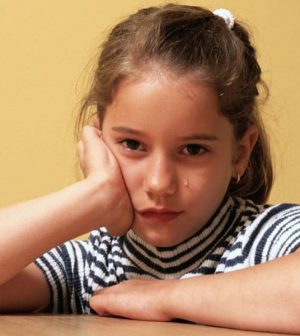- Could Your Grocery Store Meat Be Causing Recurring UTIs?
- Are You Making This Expensive Thermostat Error This Winter?
- Recognizing the Signs of Hypothyroidism
- 10 Strategies to Overcome Insomnia
- Could Artificial Sweeteners Be Aging the Brain Faster?
- Techniques for Soothing Your Nervous System
- Does the Water in Your House Smell Funny? Here’s Why
- Can a Daily Dose of Apple Cider Vinegar Actually Aid Weight Loss?
- 6 Health Beverages That Can Actually Spike Your Blood Sugar
- Treatment Options for Social Anxiety Disorder
When a Parent Has Cancer, Kids Suffer Long Term: Study

Children whose parents have cancer are more likely to struggle in school and to have lower incomes as adults, a new Danish study suggests.
The study included more than 1 million people born in Denmark from 1978 through 1999. Before their 18th birthday, about one in 20 had a parent diagnosed with cancer.
By age 15, those kids had lower grade averages in school than their classmates, the findings showed. Grade averages were lowest among children who had a parent die of cancer or who had low odds of surviving five years.
Parental cancer was also associated with a lower level of educational attainment in children, particularly if the father had cancer. This risk was 1.5 times greater if the chance of a parent surviving five years was poor, and 1.6 times greater if the parent had died.
By age 30, adults with a childhood experience with parental cancer were more likely to earn less than others, especially if the parent had low five-year survival odds or died, according to the report.
Children who were under age 5 when the parent was diagnosed appeared to be at greatest risk of problems. That suggests the impact of parental cancer in early childhood may be lasting.
“In a life course perspective, parental cancer in childhood could be considered as a potential early life stressor that may increase the health vulnerability to later life exposures, expanding the risk of later social disadvantage and poor adult health,” the researchers, led by Anne Cathrine Joergensen of the University of Copenhagen, wrote.
However, the researchers could not prove a cause-and-effect relationship.
The findings “may indicate that some children who experience parental cancer would benefit from appropriate support and early educational rehabilitation in [their] teenage years,” the study team concluded.
The study was published Aug. 20 in the Journal of Epidemiology & Community Health.
One in three people will be diagnosed with cancer during their lives, and it’s estimated that one in every six cancer survivors lives with children, the researchers noted in a journal news release.
More information
The American Cancer Society explains how to help children when a family member has cancer.
Source: HealthDay
Copyright © 2026 HealthDay. All rights reserved.










